Unit 5 Poems Learning About Language 课件(共89张PPT)-2025-2026学年人教版(2019)选择性必修第三册
文档属性
| 名称 | Unit 5 Poems Learning About Language 课件(共89张PPT)-2025-2026学年人教版(2019)选择性必修第三册 | 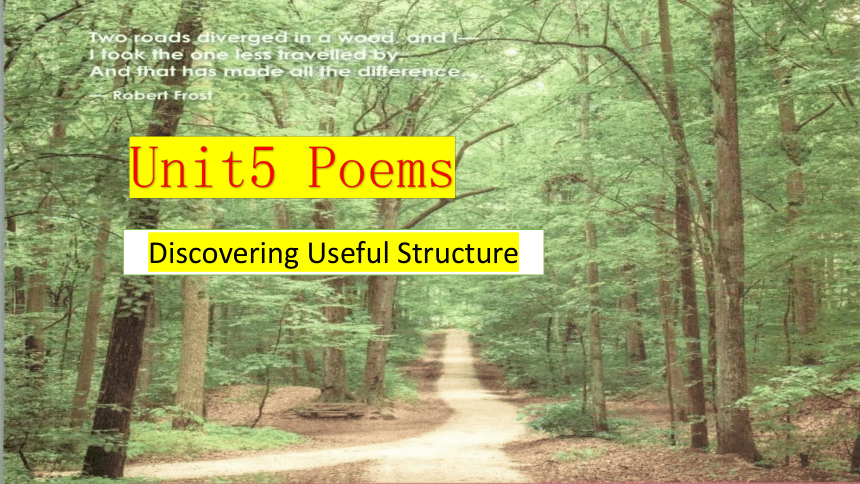 | |
| 格式 | pptx | ||
| 文件大小 | 57.1MB | ||
| 资源类型 | 教案 | ||
| 版本资源 | 人教版(2019) | ||
| 科目 | 英语 | ||
| 更新时间 | 2025-07-18 18:01:48 | ||
图片预览

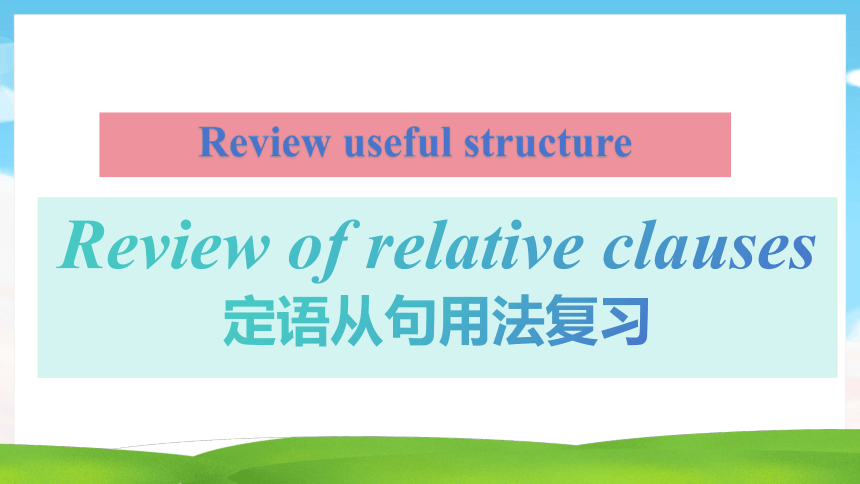
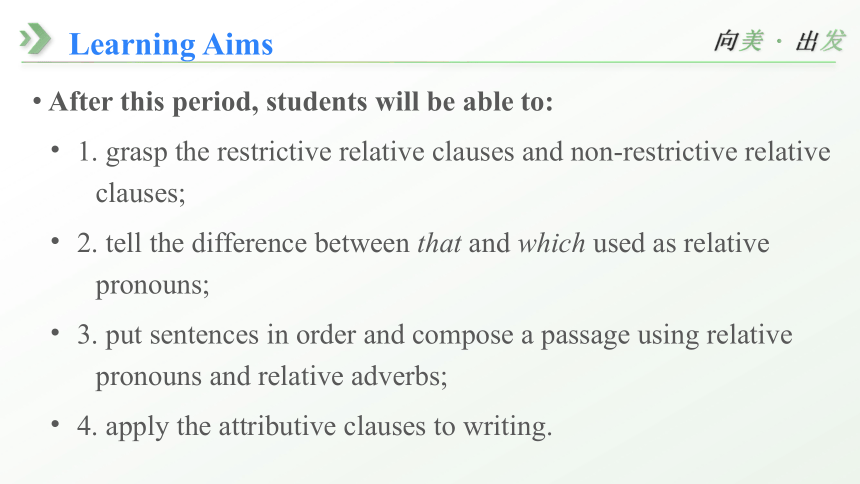
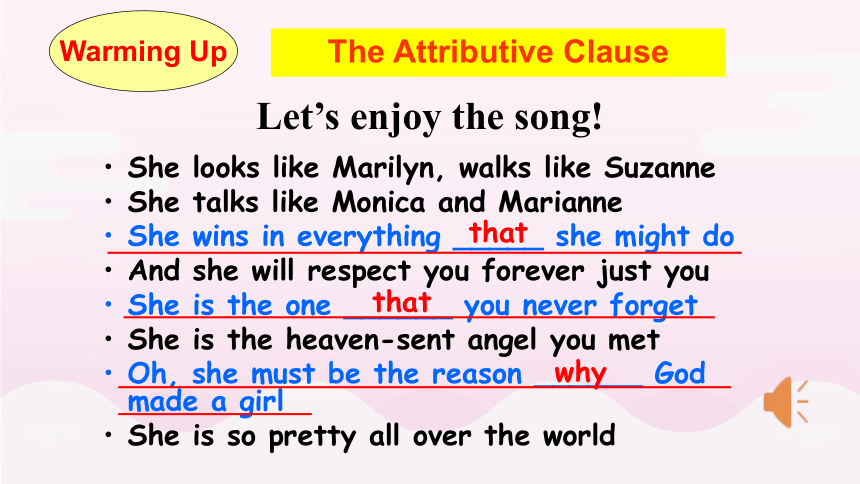
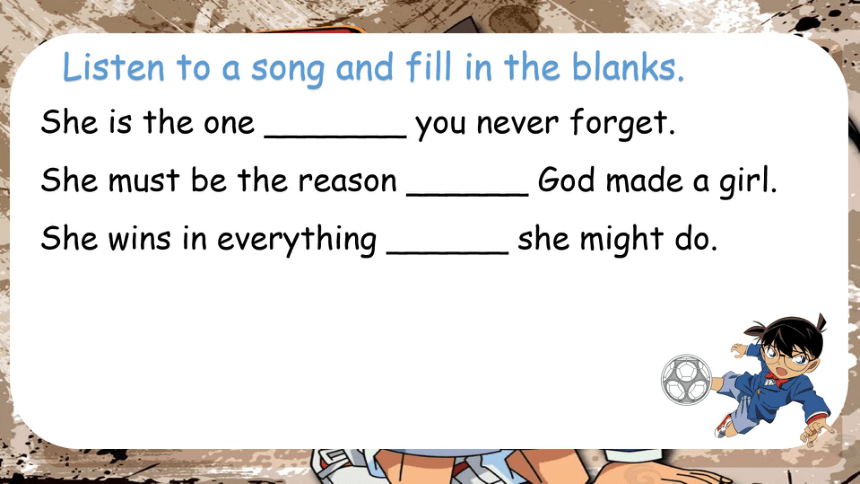
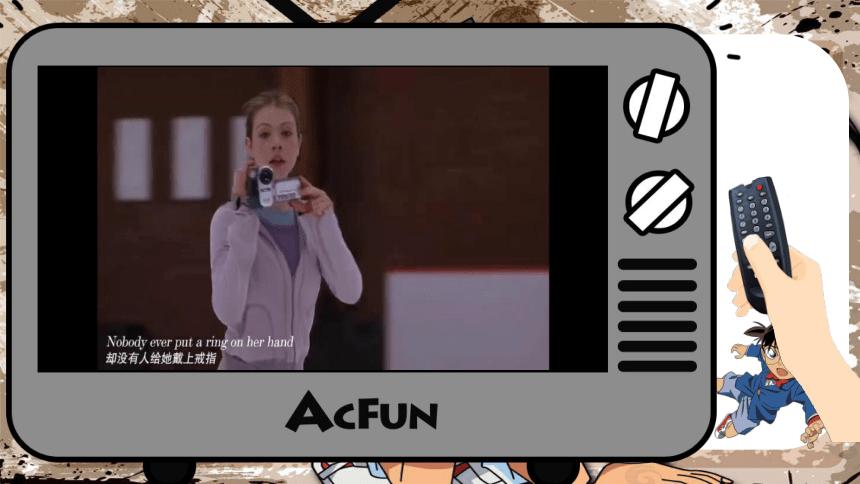
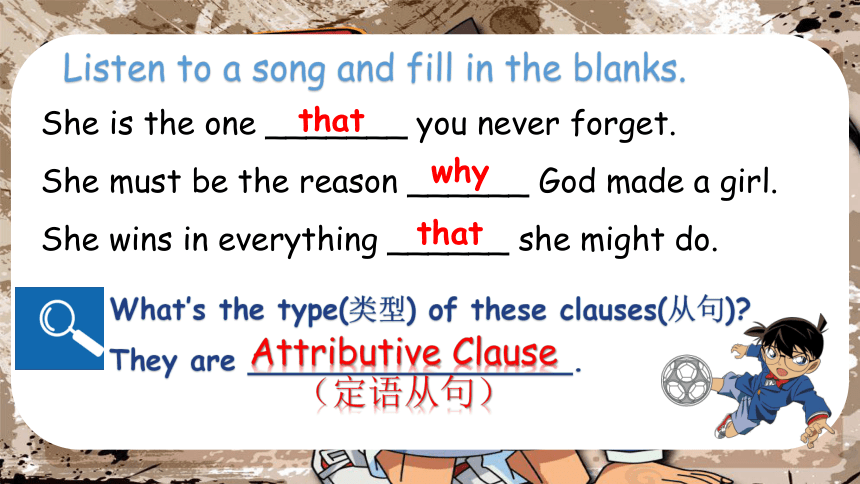
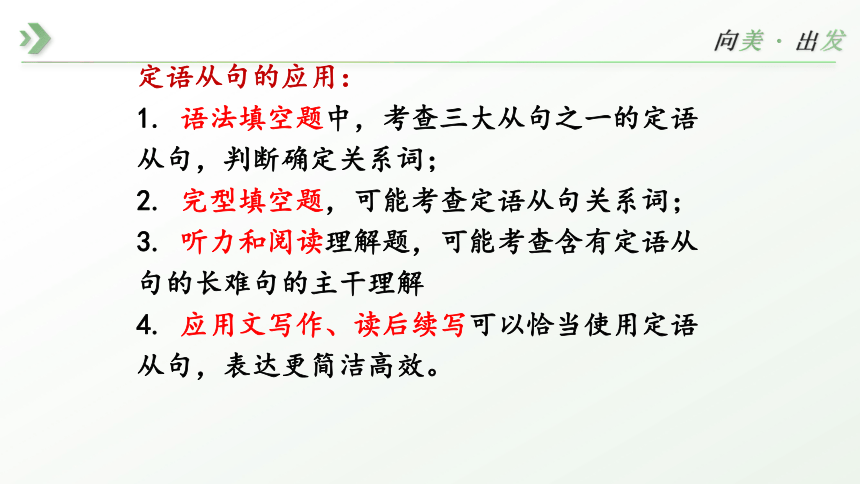
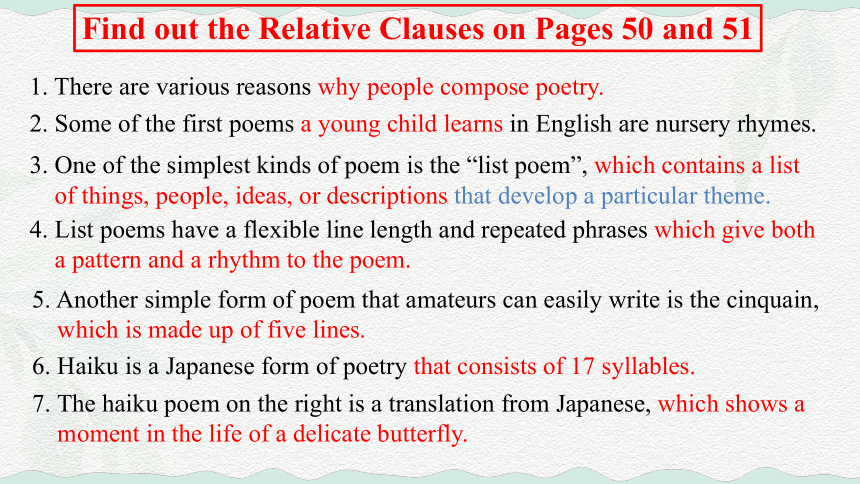
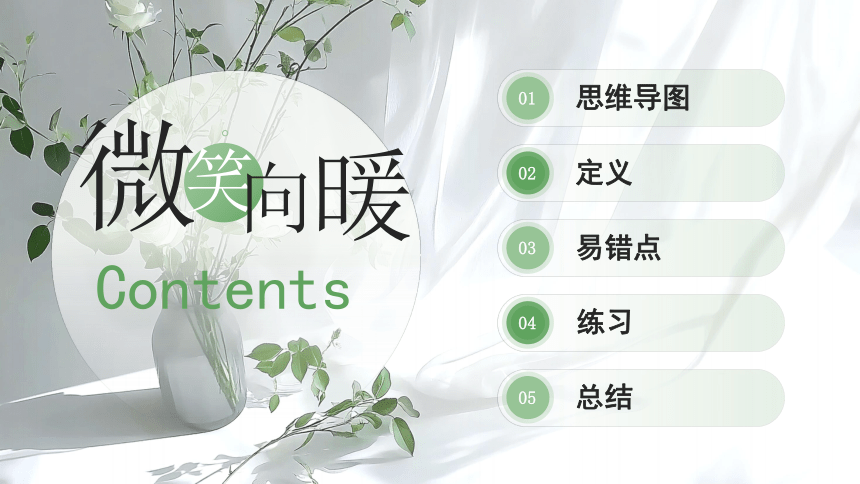

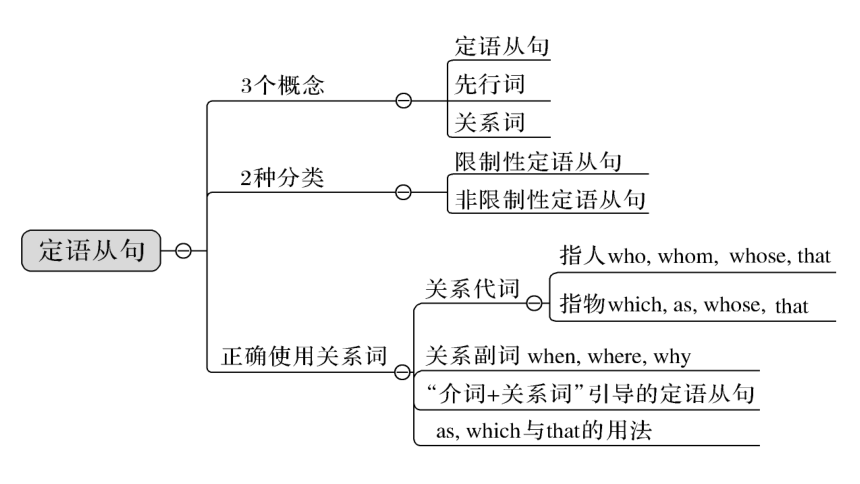
文档简介
(共89张PPT)
Unit5 Poems
Discovering Useful Structure
Review useful structure
Review of relative clauses
定语从句用法复习
After this period, students will be able to:
1. grasp the restrictive relative clauses and non-restrictive relative clauses;
2. tell the difference between that and which used as relative pronouns;
3. put sentences in order and compose a passage using relative pronouns and relative adverbs;
4. apply the attributive clauses to writing.
Learning Aims
She looks like Marilyn, walks like Suzanne
She talks like Monica and Marianne
She wins in everything _____ she might do
And she will respect you forever just you
She is the one ______ you never forget
She is the heaven-sent angel you met
Oh, she must be the reason ______ God made a girl
She is so pretty all over the world
Let’s enjoy the song!
Warming Up
that
that
why
The Attributive Clause
Listen to a song and fill in the blanks.
She is the one _______ you never forget.
She must be the reason ______ God made a girl.
She wins in everything ______ she might do.
that
why
that
What’s the type(类型) of these clauses(从句)
They are __________________.
Attributive Clause
(定语从句)
定语从句的应用:
1. 语法填空题中,考查三大从句之一的定语从句,判断确定关系词;
2. 完型填空题,可能考查定语从句关系词;
3. 听力和阅读理解题,可能考查含有定语从句的长难句的主干理解
4. 应用文写作、读后续写可以恰当使用定语从句,表达更简洁高效。
Find out the Relative Clauses on Pages 50 and 51
1. There are various reasons why people compose poetry.
2. Some of the first poems a young child learns in English are nursery rhymes.
3. One of the simplest kinds of poem is the “list poem”, which contains a list
of things, people, ideas, or descriptions that develop a particular theme.
4. List poems have a flexible line length and repeated phrases which give both
a pattern and a rhythm to the poem.
5. Another simple form of poem that amateurs can easily write is the cinquain,
which is made up of five lines.
6. Haiku is a Japanese form of poetry that consists of 17 syllables.
7. The haiku poem on the right is a translation from Japanese, which shows a
moment in the life of a delicate butterfly.
思维导图
01
微
暖
笑
向
定义
02
易错点
03
练习
04
总结
05
Contents
PPT下载 http:///xiazai/
01
思维导图
踏/浪/前/行/风/正/劲 不/负/韶/华/年/朝/夕
描述主句所涉及的人或物的具体情况,是主句不可缺少的一部分。
如省去,主句意义不完整或失去意义。
这种从句和主句关系十分密切,写时不用逗号分开。。
对主句所描述的人或物提供附加情况,起补充说明作用。
如果去掉,主句的意思仍然完整和清楚。
这种从句和主句关系不是很密切,写时往往用逗号隔开。
限制性定语从句
非限制性定语从句
1. 从句修饰先行词,关系词在从句中做成分,且在从句中作宾语时可以省略;
I'll never forget the day (that) we spent together.
2. 可以用that引导;
That is the very tool that we are looking for.
限制性定语从句
1. 从句修饰先行词或者前面的整个句子,或其中一部分。此时用关系代词which或as引导。
He suddenly fell ill, which kept him from school.
2. 不可以用that引导,主句和从句要用逗号隔开;
His dog, which he liked very much, died yesterday.
非限制性定语从句
02
定义
踏/浪/前/行/风/正/劲 不/负/韶/华/年/朝/夕
定语从句:
修饰或限定一个名词、代词或一句话的从句
This is the best film that I have seen.
定语从句
the best film
先行词
that
关系词
定语从句
定义
结构
定语从句
关系词
在复合句中修饰名词或代词,在句子中起定语作用的从句。
先行词
关系词
被修饰的名词或代词
引导定语从句的关联词
关系代词
关系副词
who whom that which whose as
when where why
eg. This is the car which he bought last year.
What is the attributive clause
1)连接作用:连接主句与从句。
2)成分作用:在定语从句中充当一个成分。
3)替代作用:替代某一名词﹑代词或某一句话。
定语从句的分类
She has two brothers who are working in the city.
She has more than two brothers.
She has two brothers, who are working in the city.
She has only two brothers.
限制性定语从句
非限制性定语从句
类型 限制性定语从句 描述主句所涉及的人或物的具体情况,是主句不可缺少的一部分;如省去,主句意义不完整或失去意义。
非限制性定语从句 对主句所描述的人或物提供附加情况,起补充说明作用;如省去,主句意义仍完整。
关系代词 (6个) that 指物和人 在从句中作主语或宾语
which 指物 在从句中作主语或宾语
who 指人 在从句中作主语或宾语
whom 在从句中作宾语
whose 指人和物 在从句中作定语
as 指物、事 在从句中作主语
关系副词(3个) when 指时间 在从句中作时间状语
where 指地点 在从句中作地点状语
why 指原因 在从句中作原因状语
引导定语从句的关系词
The house ______ windows face north belongs to him.
The man _______________ you met just now is my brother.
The man _________ is working in the playground is my old
friend.
Take the book ___________ is lying on the table.
She is such a girl ____ is always finding fault with other
people.
whose
whom / who / that
who / that
which / that
as
即学即练
指物,作定语
指人,作宾语
指人,作主语
指物,作主语
指人,作主语
They have reached the point ______ they have to separate.
Do you know the reason _____ he is absent
His interest started a few years ago, ______ he was in college and studying wildlife science.
where
why
when
即学即练
指地点,作地点状语
指原因,作原因状语
指时间,作时间状语
选择合适的关系副词(when,where,why)填空。
1.Was it in the library ________ he often went to do some reading .
2. Everyone has periods in their lives ______ everything seems hard.
3. Perhaps this is the only shop_____ you can get such cheap goods.
4. This is the reason _____ we made Mr Li headmaster of our school.
5. We are living in an age________ many things are done on computer.
6.The best part about being a doctor for the emergency department is that moment _________you know the patient can be saved.
where
where
why
when
when
when
1. The house ______ windows face north belongs to him.
2. The man _______________ you met just now is my brother.
3. The man _________ is working in the playground is my old
friend.
4. Take the book ___________ is lying on the table.
5. She is such a girl ____ is always finding fault with other people.
6. He wrote a letter _______ he explained what had happened in
the accident.
7. They have reached the point ______ they have to separate.
whose
whom / who / that
who / that
which / that
as
where
where
Challenge yourselves
03
易错点
踏/浪/前/行/风/正/劲 不/负/韶/华/年/朝/夕
定语从句易错点
关系代词 v.s. 关系副词
先行词为抽象地点where引导的定语从句
只用that 或只用which的情况
介词+关系代词引导的定语从句
whose引导的定语从句
as引导的定语从句
定语从句和其他句型
对比填空:that 、which、when、where、why
1. I will never forget the days _________ we spent together.
I will never forget the days _______ we stayed together.
2. The reason_______ he explained at the meeting was not sound.
The reason _______ he was late was that he missed his train.
3. Keep the book in place__________ you can find it easily.
This is the house ________ was built by my grandfather forty
years ago.
that/which
when
that/which
why
where
that/which
Tips:
1. 明确主句和从句。
2. 找出先行词,确定它在从句中的功能。
3. 根据先行词和关系代词或副词在从句中的功能,确定使用哪
个关系代词或副词。
先行词在定语从句中作状语时,应用关系副词 ;
若先行词在定语从句中作主语或宾语时,则应用关系代词。
如何确定 定语从句 的关系词?
确定关系词
先行词:人/物
从句缺什么成分
主宾定or状
1.找出先行词(被修饰词)
2.先行词在从句中的位置
3. 确定关系词
This is the reason ___________ he explained at the meeting.
2. This is the reason _______ I want to quit my job.
1.We visited a factory _________ makes toys for children.
2.We visited a factory ______ toys are made for children.
1. I’ll never forget the day _______ we first met.
2. I’ll never forget the day ___________ I spent with you.
which/that
where
which/that
when
The way _____________ he explained the sentence to
us was easy to understand.
2. The way ____________ he told me is practical.
that/in which
which/that
定语从句中,如果缺少主语或宾语,则用关系代词;
如果不缺主语或宾语而缺状语,则用关系副词(when/where/why).
why
which/that
关系代词 关系副词
or
选关系代词还是关系副词?
看定语从句是否缺主干成分
(主、宾、表)
是
否
关系代词
(that/ which/ who/whom
whose(定)/ as)
?
关系副词(状语)
(when时, where地, why原)
1. This is the factory _________he used to work.
2. This is the factory___________________ I visited last year.
3. Is this the museum________________you visited a few days ago
4. Is this the museum __________the exhibition was held
5. I have come to the point ______________ I can’t stand him.
6. He’s got into the situation _____________ he is heavily in debt.
7. At last he got the position___________he had been dreaming of.
难点:关系代词与关系副词的辨析
which/that /省略
where
where
which/that /省略
(work是不及物动词)
(visit是及物动词)
(从句缺少宾语)
(从句缺少地点状语)
where/at which
where/in which
(that/which)
表示地点的抽象名词
(从句缺少状语)
(从句缺少状语)
表示地点的抽象名词
(从句缺少宾语)
总结:关系代词与关系副词的选用方法
前提:定从的先行词为表示时间,地点或原因的名词时
用法 依据
根据从句谓语动词 是及物动词,后面若无宾语,用关系代词__________
是不及物动词,则用相对应的关系副词。
根据先行词在从句中做的成分 把先行词放进定语从句中
若做主语或宾语用:___________________
若做状语则用相对应的关系副词
先行词为一些表示地点的抽象名词,如situation, point, stage,position, part,condition, case 引导词在从句中
作状语用:_____________________________
作主语、宾语或表语____________________
that / which / 省略;
关系代词that / which
where或“介词+关系代词”
that/which
: that 、which、when、where、why
1. I will never forget the days _________ we spent together.
I will never forget the days _______ we stayed together.
2. The reason_______ he explained at the meeting was not sound.
The reason _______ he was late was that he missed his train.
3. Keep the book in place__________ you can find it easily.
This is the house ________ was built by my grandfather forty
years ago.
that/which
when
that/which
why
where
that/which
用适当的关系代词填空
①BMI is an internationally recognised measurement tool that/which gives an indication of whether someone has a healthy weight.
②This is the boy whose father died three years ago.
③Who is the person that is standing at the gate?
④He talked about the teachers and schools that he had visited.
⑤This is the vision phone through which we can see and talk to our friends.
⑥Those who want to go to the computer room write your names here.
that/which
whose
that
that
which
who
先行词为抽象地点 引导的定语从句
where
He often got himself into such a situation _______ everything could happen.
2. Are you facing a situation ____________ looks impossible to fix
3. I have reached a point in my life _____ I am supposed to make decisions of my own.
4. Reading is an activity __________ people enjoy a lot in their free time.
case,situation,point,scene,activity,stage,spot等抽象的地点名词,在从句中作状语时,用where引导; 作主语或宾语时,用that/which.
where
which/that
where
where
选择合适的关系副词(when,where,why)填空。
7. We are put into a position ___ we have to devote ourselves to study.
8. The training won’t stop until the players reach the point ____ they can perform accurately.
9. He’s got himself into a dangerous situation ____ he is likely to lose control over the plane.
10. Today, we’ll discuss a number of cases ____ beginners of English fail to use the language properly.
where
where
where
where
表抽象意义的模糊地点词case,point,situation,position,spot,occasion,stage,scene做先行词,关系词可用where
致力于
adv.准确地
adv.恰当的,得体的
用适当的关系词填空
①This is the case where he’s had all his money stolen.
②The treatment will continue until the patient reaches the point where he can walk correctly and safely.
③There are several research centers in China where a certain disease called Bird Flu is being studied.
④The time is not far away when modern communications will become widespread in China’s vast countryside.
⑤Can you help me to think of a reason that/which seems reasonable for my being absent?
where
where
where
when
that/which
All ____ is needed is money and hands.
The third place _____ we are going to visit is Hangzhou.
He’s the only boy in our city ____ enters the Beijing University.
She described in her compositions the people and places ______ impressed her most.
Who is the girl _____ drove the car
只用that 只用which
v.s
He came up with a suggestion, _______ proved to be more than practical.
This is the great moment to ________ I look forward.
that
that
that
that
that
which
which
1.当先行词是指物的不定代词(all, little, much, everything, none等)或被不定代词所修饰时
2.当先行词是序数词、形容词最高级或被其修饰时
3.当先行词被 the very, the only, the next, the last, the same, the right等所修饰时
4.当先行词为指人和指物的两个并列名词词组时
5.当主句是以who, which, what开头的特殊疑问句时。
2.当先行词是物,且关系词位于介词后时,只能用which
1.引导非限定性定语从句时,只能用which
Exercises
(7) All ___________ we have to do is to practise every day.
(8) I have read all the books _________ you gave me.
(9) The first lesson _______ I learned will never be forgotten.
(10) He is the only person _________ I want to talk to.
(11) We are talking about the people and the places ________ we have visited in the countryside.
(12) Which is the books ________ you want to buy
that
that
that
that
that
that
+
介词 关系代词
Do you know the boy ______ ______ your mother is talking
2. He gave me some novels _____ ______ I am not very familiar.
3. I still remember the day ___ ______ I first got to Paris.
4. He has three brothers, ____ ______ Li Lei is the youngest one.
根据介词和定语从句中动词的习惯搭配。
根据介词和定语从句中形容词的习惯搭配。
根据介词和先行词的习惯搭配。
在非限制定语从句中表示”所有关系”或”整体中的一部分”,用of which/of whom
to/with whom
with which
on which
of whom
如何判断选择哪个介词?
当关系代词在定语从句中做介词的宾语时,通常用“介词+关系代词”引导定语从句。此结构既可用于限制性定从,也可用于非限制性定从。若先行词指“人”,用“介词+whom”;若先行词指“物”,用“介词+which”。
要掌握“介词+ 关系代词”引导的定语从句,我们要注意:
在介词后作宾语的关系代词一般只有which,whom 和whose。如先行词是物,引导词用which;如先行词是人,引导词用whom;whose 适用于两者,但要注意whose 后面有它所修饰的名词或代词,因为whose 在定语从句中起到形容词的作用。
The boss in whose company I worked for 10 years has retired.
我供职十年的那家公司的老板退休了。
“介词+ 关系代词”引导的定语从句
1. It is the fifth time that she has won the race, _______ made all
of us amazed.
2. I had told them the reason, _________ I didn’t attend the
meeting.
which
for which
that, why 不引导非限制性定语从句
1. The valley ________the town lies is heavily polluted.
2. He paid the boy $10 for washing ten windows, most ________
hadn’t been cleaned for at least a year.
3. In the dark street, there wasn’t a single person _________ she
could turn for help.
in which
of which
to whom
介词+关系代词(which/whom)
选用介词时要注意与先行词的搭配和与谓语动词的搭配习惯
4. Recently, I bought an ancient vase, the price of which was very reasonable.
5. He has ten cousins,the youngest of whom is very clever.
1. We are looking for the person to whom the book belongs.
2. I never forget the day on which I came to this school.
3. This is my pair of glasses without which I cannot see clearly.
介词+关系代词
名词/代词+of+关系代词
可转化为“whose+名词”结构
数词/形容词最高级+of+关系代词
数词还可以被some, many, most, each等不定代词替换
谓语动词与介词的搭配
介词与先行词的搭配
所要表达的意思来确定介词
to whom
on which
without which
介词选用规则2:
谓语动词固定搭配
03
01
代词选用规则1:指物,常用 which__
02
代词选用规则2:指人,常用 whom
04
介词选用规则4:
of所属,整体与部分
05
介词选用规则3:
先行词搭配
06
介词选用规则1:
句子意思
总结难点:关系代词与介词的选用规则
结合上课笔记复习
P114
+
介词 关系代词
Do you know the boy ___ ____ your mother is talking
2. He gave me some novels _____ ______ I am not very familiar.
3. I still remember the day ___ ______ I first got to Paris.
4. He has three brothers, ____ ______ Li Lei is the youngest one.
根据介词和定语从句中动词的习惯搭配。
根据介词和定语从句中形容词的习惯搭配。
根据介词和先行词的习惯搭配。
在非限制定语从句中表示”所有关系”或”整体中的一部分”,用of which/of whom
to whom
with which
on which
of whom
用适当的“介词+关系代词”结构填空
①100℃ is the temperature at which water will boil.
②Wind power is an ancient source of energy to which we may return in the near future.
③Great changes have taken place in the city in which she grew up.
④They have a friend, the daughter of whom is working in that big company now.
⑤Scientists have many advanced theories about why human beings cry tears, none of which has been proved.
at which
to which
in which
of whom
of which
⑥He wrote many children’s books, nearly half of which were published in the 1990s.
⑦I met the fruit-pickers, several of whom were university students.
⑧His car, for which he paid £1,000, is now only worth £500.
⑨Ashdown forest, through whic we’ll be driving, isn’t a forest any longer.
of which
of whom
for which
through which
1. The knife ______ ______ he cut things was lost yesterday.
2. A good friend is a person _______ ______ we turn for help when we are in trouble.
3. Shanghai is the city _______ _______ he was born.
4. I don’t like the way ________ _________ he looks at me.
5. The old scientist ________ ________ we often communicate will come tomorrow.
6. A foreign language is a tool ________ ________ one can get new information.
7. He did not tell us the reason ________ ________ he was late again.
8. What do you think of the material ________ ________ your coat was made
9.Would you be kind enough to help the boy ______ ______ Chinese is really hard to learn.
10. The book has opened a window _________ ________we can see a wonderful world outside.
用“介词 + whom/which”填空
with which
to whom
in which
in which
with whom
with which
for which
of which
through which
for whom
cut things with knife 用刀切东西
turn to sb for help向某人寻求帮助
look at me in the way用这种方式看着我
communicate with sb和某人交流
be made of由....制成
for the boy对于这个男孩
= the + n. of which/whom
whose
1. The Wanquan River _______ banks are covered with trees flows to the sea.
2. Her parents wouldn’t let her marry anyone _______ family was very poor.
3. I made a table, ______ surface is quite smooth.
I made a table, _________________ is quite smooth.
I made a table, _________________ is quite smooth.
whose
whose
whose
the surface of which
of which the surface
whose 在从句中作定语,指先行词与从句中某个名词有所属关系,表示“……的”,它既可以指代人,也可以指代物,既可引导限制性定语从句,也可以引导非限制性定语从句。
whose引导定语从句时,通常可与of which/of whom引导的定语从句进行转换。
Exercises
(1) I wish to thank Professor Smith,without help I would never have got this far.
(2) The prize will go to the writer story shows the most vivid imagination.
(3)The room the window_____ _____ faces to south is mine.
(4) The injured boy ______ mother was lost in the disaster was taken to the hospital.
(65) He lives in a room _______ window faces north.
whose
whose
whose
whose
of which
的用法
as
一、As引导的限制性定语从句
1. This is such an interesting book ____ we all like.
2. This is so interesting a book _____ we all like.
3. He is as clever a boy ____ you can imagine.
as引导限制性定语从句先行词前常被such, the same, so, as 修饰,即构成such…as , the same …as, so…as结构,做题时容易忽略。as在定语从句中应充当成分如:主语、宾语或表语。
as
as
as
as 引导非限制性定语从句常用的固定表达:
as we all know众所周知 as is well known众所周知
as you see 如你所见 as can be seen 正如所见
as we expect 正如我们预料的那样 as is/was expected 正如预料的那样
as often happens 正如经常发生的 as I can remember 正如我所记得的
as has been said before 如前所述 as is often the case 情况常常是这样
2. as 引导非限制性定语从句
As is often the case,girls like dolls while boys like guns.
As we all know, paper was invented in China.
as引导非限制性定语从句,代替整个主句内容。从句可放在主句前、主句后或主句中间。as具有“正如,正像……”等意思
1
相同点:
关系代词as 与which 引导的非限制性定语从句,其先行词都可以是整个主句
3
不同点1 :
as 引导的定语从句表示说话人的看法、态度、解释或评论。as仍具有“正如,像,由……可知”等意思,翻译时有时可不必译出。as 引导的此类从句可置于句首、句中或句尾。
2
但:
as 和which 具有不同的词义、句法和用法
4
不同点2 :
which 引导的定语从句对主句所叙述的事情进行补充说明,表明事物的状态或结果,常译为“这一点,这件事”等。这时它引导的从句与主句之间常含有并列、因果关系。只能位于主句的后面。
难点:as 与 which 引导的非限制性定语从句的区别
用适当的关系词填空
①He didn’t pass the exam, as we had expected.
②There is lots of air in loose snow, which can keep the cold out.
③ As is known to all, the Earth goes around the sun.
④“You can’t judge a book by its cover,” as the old saying goes.
⑤He said that he had never seen her before, which was not true.
as
which
As
as
which
⑥The air quality in the city, is shown in the report,has declined over the past two months.
⑦A lot of language learning, has been discovered,is happening in the first
as
as
定语从句 其他句型
v.s
It was in this house _____ he was born.
It was the house ______ he was born.
定语从句和强调句
定语从句和同位语从句
We all have heard the news_____ our team won.
We don’t believe the news ____________ he told us yesterday.
that
where
that
that/which
He is such a kind person _____ everybody likes.
He is such a kind person _____ everybody likes him.
定语从句和状语从句
Mr. Li has three daughters, none of _______ is an engineer.
Mr. Li has three daughters, but none of _______ is a dancer
定语从句和并列句
as
that
whom
them
Summarise
Practice makes perfect!
04
练习
踏/浪/前/行/风/正/劲 不/负/韶/华/年/朝/夕
Complete the sentences.
1. He is the man has offered some
useful advice.
2. It is the most interesting book he has
ever read.
3. He is the boy of we are proud in our
school.
4. The building doors are white is an
office building.
5. Anyone has helped to save the old man
is worth praising.
who/that
that
whom
whose
who
6. Mary was much kinder to Jack than she was to
the others, ,of course,made all
the others upset.
7. She has a gift for creating an atmosphere for
her students allows them to
communicate freely with each other.
8. I was given three books on cooking,the first of
I really enjoyed.
9. is reported in the newspapers,talks
between the two countries are making progress.
which
that/which
which
As
10. She is the only one of the children who
(be) good at music here.
11. There was a time I became dizzy at
the thought of study.
12. Between the two parts of the concert is a
break, the audience can purchase
ice- cream.
is
when
when
用适当的关系词填空。
1. Though it is the only unnatural thing on your way up the mountain, still it highlights the whole adventure and offers a place ________ you can sit down to rest your aching legs. (2021新高考I卷)
2. The Xi'an City Wall is the most complete city wall ________ has survived China's long history. (2021全国甲卷)
where
that
3. In around 8 A.D., the Romans built the Colosseum, ________ remains the world's best known stadium and continues to inform contemporary design. (2021全国乙卷)
4. The result was Project Wild Thing, a film ____________ charts the birth of the Wild Network, a group of organisations with the common goal of getting children out into nature. (2021.6月浙江卷)
which
that / which
5. China first had to put a satellite in orbit above the moon in a spot ________ it could send signals to the spacecraft and to Earth. (2020新课标全国I卷)
6. In ancient China lived an artist ________ paintings were almost lifelike. (2020新课标全国III卷)
where
whose
7. The 80,000 objects collected by Sir Hans Sloane, for example, formed the core collection of the British Museum ___________ opened in 1759. (2020全国新高考I卷)
which/that
1. (重庆卷·9)We’ll reach the sales targets in a month __ ___ we set at the beginning of the year.
2. (福建卷·31)Students should involve themselves in community activities ____ they can gain experience for growth.
3. (湖南卷·31)I am looking forward to the day my daughter can read this book and know my feelings for her.
4. (浙江卷·5)I didn’t become a serious climber until the fifth grade, _____ I went up to rescue a kite that was stuck in the branches of a tree.
5. (江西卷·28).Among the many dangers ______ sailors have to face, probably the greatest of all is fog.
高考真题,试一试
缺宾语
which/that
where
使参与;使介入
when
拯救,营救
被困住
when
缺宾语
that
6. (江西卷·35).It was the middle of the night______________my father woke me up and told me to watch the football game.
7. (江苏卷·22)The book has helped me greatly in my daily communication, especially at work_____________a good impression is a must.
8. (陕西卷·13)Please send us all the information____________you have about the candidate for the position.
9. (四川卷·T4)Until now, we have raised 50,000 pounds for the poor children, _____________is quite unexpected.
10. (北京卷·26)I borrowed the book Sherlock Holmes from the library last week,___________my classmates recommended to me.
高考真题,试一试
when
where
that
缺主语
which
缺宾语
which
11. (天津卷·12)English is a language shared by several diverse cultures, each of ___________uses it differently.
12. (安徽卷·22)The exact year_______Angela and her family spent together in China was 2008.
13. (山东卷·10)A company______profits from home markets are declining may seek opportunities abroad.
14. (安徽卷·T29)Mo Yan was awarded the Nobel Prize for Literature in 2012, ______made one of the Chinese people’s long-held dreams come true.
15.(天津,11,改编)Their child is at the stage___________she can say individual words but not full sentences.
高考真题,试一试
which
缺宾语
which
利润
减少
whose
which
where
1.(2019 全国 I) One afternoon ______ I was in primary school, I was walking by the school playground.
2. (2019 全国 III) They were well trained by their masters _______ had great experience with caring for these animals.
3. (2018 全国 I) They also had a small pond ______ they raised fish.
when
who/that
where
Fill in the blank with proper relative words
4. (2016 全国II) Simon is a comedian and actor ________ has 10 year's experience of teaching comedy.
5. (2020 全国II) In ancient China lived an artist _______ paintings were almost life like.
6. You reach a point ______medicine can’t help.
who/that
whose
where
Fill in the blank with proper relative words
当先行词为situation, case, stage, point,condition等抽象名词时,在定语从句中充当状语时用关系副词where.
The man _______lives next to us sells vegetables.
A plane is a machine _________ can fly.
This is the scientist __________ name is known to all.
The room ___________ window faces to south is mine.
Do you remember the day __________ we first met
6. The school ____________ we study is beautiful.
7. The reason __________ he was late was that he missed the train.
8.This is the pilot by ______ my son was saved.
9. This is the most interesting story______ I’ve ever read.
10. He has the same dictionary _____ I bought yesterday.
exercise
11. I bought a great many books on _____ I spent all my money that I saved.
12. The little problems _____ we meet in our daily lives may be inspirations for great inventions.
13. _____ is often the case, we have worked out the production plan.
Isaac Asimov was an American scientist and writer 1. wrote around 500 books 2. included mystery stories, science and history books, and even books about Shakespeare. But his best known work was his science fiction stories. Asimov had both an extraordinary imagination 3. gave him the ability to explore future worlds and an amazing mind with 4. he searched for explanations of everything in the present and the past. Asimov's life began in Russia, 5. he was born on 2 January, 1920. It ended in New York on 6 April, 1992, 6. he died as a result of an HIV infection
7. he had got from a blood transfusion nine years earlier. When Asimov was three, he moved to New York with his family. There his parents bought a candy store 8 they ran for the next 40 or so years. At the age of nine, 9. his mother was pregnant with her third child, Asimov started working in the candy store.
用合适的关系代词或关系副词填空
who
that/which
that/which
which
where
when
that/which
that/which
when
1. The Crescent Moon is perhaps the most famous collection of children’s poems. It is known to people in China.
The Crescent Moon is perhaps the most famous collection of children’s poems that is known to people in China.
Connect the sentences using relative pronouns or adverbs.Exercise1
2. There are also many poems written from a child’s perspective. In these poems the poet Tagore shows a sympathetic understanding of children’s feelings.
There are also many poems written from a child’s perspective in which the poet Tagore shows a sympathetic understanding of children’s feelings.
3. The English version of the book contains nearly 50 poems. The focus of the poems is on the parent-child relationship.
The English version of the book contains nearly 50 poems, the focus of which is on the parent-child relationship.
4. The initial poems were written from the perspective of a mother. The mother loves her baby at play and at rest, in laughter and in tears.
The initial poems were written from the perspective of a mother who loves her baby at play and at rest, in laughter and in tears.
5. Many people love to read this collection of poems. The reason is that they can feel the warmth of love and enjoy the innocence of childhood.
The reason why many people love to read this collection of poems is that they can feel the warmth of love and enjoy the innocence of childhood.
6. It was written by the Indian poet Tagore. Tagore was the first Asian to win the Nobel Prize in Literature.
It was written by the Indian poet Tagore who was the first Asian to win the Nobel Prize in Literature.
The Crescent Moon is perhaps the most famous collection of children’s poems that is known to people in China. It was written by the Indian poet Tagore who was the first Asian to win the Nobel Prize in Literature. The English version of the book contains nearly 50 poems, the focus of which is on the parent-child relationship. The initial poems were written from the perspective of a mother who loves her baby at play and at rest, in laughter and in tears. There are also many poems written from a child’s perspective in which the poet Tagore shows a sympathetic understanding of children’s feelings. The reason why many people love to read this collection of poems is that they can feel the warmth of love and enjoy the innocence of childhood.
The Crescent Moon, which is known to people in China, is perhaps the most famous collection of children’s poems. It was written by the Indian poet Tagore, who was the first Asian to win the Nobel Prize in Literature. The English version of the book contains nearly 50 poems whose focus is on the parent-child relationship. The initial poems were written from the perspective of a mother who loves her baby at play and at rest, in laughter and in tears. There are also many poems written from a child’s perspective, in which the poet Tagore shows a sympathetic understanding of children’s feelings. The reason why many people love to read this collection of poems is that they can feel the warmth of love and enjoy the innocence of childhood.
The correct order to compose a passage
________________________
1 5 3 4 6 2
05
总结
踏/浪/前/行/风/正/劲 不/负/韶/华/年/朝/夕
语
法
脉
图
总结做题技巧:
1. 明确主句和从句。
2. 找出先行词,确定它在从句中的功能。
3. 根据先行词和关系代词或副词在从句中的功能,确定使用哪
个关系代词或副词。
先行词在定语从句中作状语时,应用关系副词 ;
若先行词在定语从句中作主语或宾语时,则应用关系代词。
易错对比练习
1. 1) Mr Li has three daughters,none of _____ is an engineer.
2) Mr Li has three daughters,but none of _____ is a dancer.
2. 1) It was eleven o’clock _____ they went out of the cinema.
2) It was at eleven o’clock _____ they went out of the cinema.
3 .1) It was in the hospital____ he came across a friend of his.
2) It was the hospital ____ he came across a friend of his.
4. 1). We should go to the place _____ we are most needed.
2). We should go to the place _____ needs us most.
5. 1) Mother didn't come back on December 25, _____was my birthday.
2)Mother didn't come back home on December 25, _____she was busy working.
whom
them
when
that
where
that
where
which/that
which
when
6.1) This is the room __________ he lived in his childhood.
2) This is the room ________ he lived in last year.
7. 1) The teacher didn’t know the reason _______ she was absent yesterday
2) The teacher couldn’t accept the reason ___________ she explained yesterday
8.1) We must learn to act in ways ___________ do not harm other living things.
2) I don’t like the way ___________________ he spoke to his mother.
3) This is the way ____________ he thought of to solve the problem.
9.1) He is such a good teacher ______ we all like.
2) He is such a good teacher ______ we all like him.
3) He is a good teacher, _________ makes us respect him.
10. 1) Rice doesn’t grow well _____ there is not enough water.
2) I still remember the farm ________ my parents worked ten years ago.
where
which
why
which/that
which/that
that/in which/不填
which/that
as
that
which
where
where
11.1) _____ we all know, China is rich in natural resources.
2) _____ is well-known that China is rich in natural resources.
3) _____ is well-known to us all is that China is rich in natural resources.
12. 1) I’m surprised at all _____ he said at the meeting.
2) I’m surprised at _____ he said at the meeting.
13. 1) _____ leaves the room last ought to turn off the lights.
2) _____ who leaves the room last ought to turn off the lights.
3) _____ who leave the room last ought to turn off the lights.
14.1)This is one of the most interesting films _____ shown last week.
2)This is the very one of the most interesting films _____ shown last week.
Whoever
What
Anyone
Those
that were
that was
As
It
that
what
15.1) He still lives in the room ___________ window faces to the east.
2) He still lives in the room, the window _________which faces to the east.
3) He still lives in the room _____ is in the north of the city.
4) He still lives in the room _____ there is a beautiful table.
16. 1).Is this museum _____ they visited yesterday
2). Is this the museum _____ they visited yesterday
3). Is this museum ______ they stayed yesterday
4). Is this the museum ______ they stayed yesterday
5). Is the museum ______ you visited yesterday beautiful
6). It was the museum ______ you saw many treasures.
7). It was in the museum ______ you saw many treasures.
8). It was in the museum ______________you stayed in that you saw many treasures.
the one
that/which/不填
where
that/which/不填
where
that/which/不填
where
that
whose
of
which/that
where
17. 1)______ is known is that he has gone to college.
2)______ is known that he has gone to college.
3)______ is known, he has gone to college.
4) We all know _____ he has gone to college.
5) He has gone to college, ____ made us surprised.
6) He has gone to college and ______ made us surprised.
7) He has gone to college, ________ surprised us.
8)______ surprised us most was ______ he has gone to college.
18. 1) He arrived in Beijing in 1984, _____ he became a manager some years later.
2) He arrived in Beijing in 1984, _____ was important for him.
3) He arrived in Beijing in 1984, _____ he was already in his fifties.
4) It was in 1984 ______ he arrived in Beijing.
It
What
As
that
it
which
What
which
that
where
which
when
that
Baby won't you tell me why there is sadness in your eyes
I don't wanna say goodbye to you
Love is one big illusion (that\which)I should try to forget
but there is something left in my head
You're the one _______set it up now you're the one to make it stop
I'm the one ______ is feeling lost right now
Now you want me to forget every little thing (that) you said
but there is something left in my head
I won't forget the way (that) you're kissing
The feeling's so strong were lasting for so long
But I'm not the man (who) your heart is missing
That's why you go away I know
That's why you go away
who
who
1.Write an article to introduce your favorite poetry or poem using sentences that contain relative clauses.
2.Finish textbook exercise on page 53.
凉亭还独步 曾是凭阑
携手心盟指云汉
中国印象
Thank you
Unit5 Poems
Discovering Useful Structure
Review useful structure
Review of relative clauses
定语从句用法复习
After this period, students will be able to:
1. grasp the restrictive relative clauses and non-restrictive relative clauses;
2. tell the difference between that and which used as relative pronouns;
3. put sentences in order and compose a passage using relative pronouns and relative adverbs;
4. apply the attributive clauses to writing.
Learning Aims
She looks like Marilyn, walks like Suzanne
She talks like Monica and Marianne
She wins in everything _____ she might do
And she will respect you forever just you
She is the one ______ you never forget
She is the heaven-sent angel you met
Oh, she must be the reason ______ God made a girl
She is so pretty all over the world
Let’s enjoy the song!
Warming Up
that
that
why
The Attributive Clause
Listen to a song and fill in the blanks.
She is the one _______ you never forget.
She must be the reason ______ God made a girl.
She wins in everything ______ she might do.
that
why
that
What’s the type(类型) of these clauses(从句)
They are __________________.
Attributive Clause
(定语从句)
定语从句的应用:
1. 语法填空题中,考查三大从句之一的定语从句,判断确定关系词;
2. 完型填空题,可能考查定语从句关系词;
3. 听力和阅读理解题,可能考查含有定语从句的长难句的主干理解
4. 应用文写作、读后续写可以恰当使用定语从句,表达更简洁高效。
Find out the Relative Clauses on Pages 50 and 51
1. There are various reasons why people compose poetry.
2. Some of the first poems a young child learns in English are nursery rhymes.
3. One of the simplest kinds of poem is the “list poem”, which contains a list
of things, people, ideas, or descriptions that develop a particular theme.
4. List poems have a flexible line length and repeated phrases which give both
a pattern and a rhythm to the poem.
5. Another simple form of poem that amateurs can easily write is the cinquain,
which is made up of five lines.
6. Haiku is a Japanese form of poetry that consists of 17 syllables.
7. The haiku poem on the right is a translation from Japanese, which shows a
moment in the life of a delicate butterfly.
思维导图
01
微
暖
笑
向
定义
02
易错点
03
练习
04
总结
05
Contents
PPT下载 http:///xiazai/
01
思维导图
踏/浪/前/行/风/正/劲 不/负/韶/华/年/朝/夕
描述主句所涉及的人或物的具体情况,是主句不可缺少的一部分。
如省去,主句意义不完整或失去意义。
这种从句和主句关系十分密切,写时不用逗号分开。。
对主句所描述的人或物提供附加情况,起补充说明作用。
如果去掉,主句的意思仍然完整和清楚。
这种从句和主句关系不是很密切,写时往往用逗号隔开。
限制性定语从句
非限制性定语从句
1. 从句修饰先行词,关系词在从句中做成分,且在从句中作宾语时可以省略;
I'll never forget the day (that) we spent together.
2. 可以用that引导;
That is the very tool that we are looking for.
限制性定语从句
1. 从句修饰先行词或者前面的整个句子,或其中一部分。此时用关系代词which或as引导。
He suddenly fell ill, which kept him from school.
2. 不可以用that引导,主句和从句要用逗号隔开;
His dog, which he liked very much, died yesterday.
非限制性定语从句
02
定义
踏/浪/前/行/风/正/劲 不/负/韶/华/年/朝/夕
定语从句:
修饰或限定一个名词、代词或一句话的从句
This is the best film that I have seen.
定语从句
the best film
先行词
that
关系词
定语从句
定义
结构
定语从句
关系词
在复合句中修饰名词或代词,在句子中起定语作用的从句。
先行词
关系词
被修饰的名词或代词
引导定语从句的关联词
关系代词
关系副词
who whom that which whose as
when where why
eg. This is the car which he bought last year.
What is the attributive clause
1)连接作用:连接主句与从句。
2)成分作用:在定语从句中充当一个成分。
3)替代作用:替代某一名词﹑代词或某一句话。
定语从句的分类
She has two brothers who are working in the city.
She has more than two brothers.
She has two brothers, who are working in the city.
She has only two brothers.
限制性定语从句
非限制性定语从句
类型 限制性定语从句 描述主句所涉及的人或物的具体情况,是主句不可缺少的一部分;如省去,主句意义不完整或失去意义。
非限制性定语从句 对主句所描述的人或物提供附加情况,起补充说明作用;如省去,主句意义仍完整。
关系代词 (6个) that 指物和人 在从句中作主语或宾语
which 指物 在从句中作主语或宾语
who 指人 在从句中作主语或宾语
whom 在从句中作宾语
whose 指人和物 在从句中作定语
as 指物、事 在从句中作主语
关系副词(3个) when 指时间 在从句中作时间状语
where 指地点 在从句中作地点状语
why 指原因 在从句中作原因状语
引导定语从句的关系词
The house ______ windows face north belongs to him.
The man _______________ you met just now is my brother.
The man _________ is working in the playground is my old
friend.
Take the book ___________ is lying on the table.
She is such a girl ____ is always finding fault with other
people.
whose
whom / who / that
who / that
which / that
as
即学即练
指物,作定语
指人,作宾语
指人,作主语
指物,作主语
指人,作主语
They have reached the point ______ they have to separate.
Do you know the reason _____ he is absent
His interest started a few years ago, ______ he was in college and studying wildlife science.
where
why
when
即学即练
指地点,作地点状语
指原因,作原因状语
指时间,作时间状语
选择合适的关系副词(when,where,why)填空。
1.Was it in the library ________ he often went to do some reading .
2. Everyone has periods in their lives ______ everything seems hard.
3. Perhaps this is the only shop_____ you can get such cheap goods.
4. This is the reason _____ we made Mr Li headmaster of our school.
5. We are living in an age________ many things are done on computer.
6.The best part about being a doctor for the emergency department is that moment _________you know the patient can be saved.
where
where
why
when
when
when
1. The house ______ windows face north belongs to him.
2. The man _______________ you met just now is my brother.
3. The man _________ is working in the playground is my old
friend.
4. Take the book ___________ is lying on the table.
5. She is such a girl ____ is always finding fault with other people.
6. He wrote a letter _______ he explained what had happened in
the accident.
7. They have reached the point ______ they have to separate.
whose
whom / who / that
who / that
which / that
as
where
where
Challenge yourselves
03
易错点
踏/浪/前/行/风/正/劲 不/负/韶/华/年/朝/夕
定语从句易错点
关系代词 v.s. 关系副词
先行词为抽象地点where引导的定语从句
只用that 或只用which的情况
介词+关系代词引导的定语从句
whose引导的定语从句
as引导的定语从句
定语从句和其他句型
对比填空:that 、which、when、where、why
1. I will never forget the days _________ we spent together.
I will never forget the days _______ we stayed together.
2. The reason_______ he explained at the meeting was not sound.
The reason _______ he was late was that he missed his train.
3. Keep the book in place__________ you can find it easily.
This is the house ________ was built by my grandfather forty
years ago.
that/which
when
that/which
why
where
that/which
Tips:
1. 明确主句和从句。
2. 找出先行词,确定它在从句中的功能。
3. 根据先行词和关系代词或副词在从句中的功能,确定使用哪
个关系代词或副词。
先行词在定语从句中作状语时,应用关系副词 ;
若先行词在定语从句中作主语或宾语时,则应用关系代词。
如何确定 定语从句 的关系词?
确定关系词
先行词:人/物
从句缺什么成分
主宾定or状
1.找出先行词(被修饰词)
2.先行词在从句中的位置
3. 确定关系词
This is the reason ___________ he explained at the meeting.
2. This is the reason _______ I want to quit my job.
1.We visited a factory _________ makes toys for children.
2.We visited a factory ______ toys are made for children.
1. I’ll never forget the day _______ we first met.
2. I’ll never forget the day ___________ I spent with you.
which/that
where
which/that
when
The way _____________ he explained the sentence to
us was easy to understand.
2. The way ____________ he told me is practical.
that/in which
which/that
定语从句中,如果缺少主语或宾语,则用关系代词;
如果不缺主语或宾语而缺状语,则用关系副词(when/where/why).
why
which/that
关系代词 关系副词
or
选关系代词还是关系副词?
看定语从句是否缺主干成分
(主、宾、表)
是
否
关系代词
(that/ which/ who/whom
whose(定)/ as)
?
关系副词(状语)
(when时, where地, why原)
1. This is the factory _________he used to work.
2. This is the factory___________________ I visited last year.
3. Is this the museum________________you visited a few days ago
4. Is this the museum __________the exhibition was held
5. I have come to the point ______________ I can’t stand him.
6. He’s got into the situation _____________ he is heavily in debt.
7. At last he got the position___________he had been dreaming of.
难点:关系代词与关系副词的辨析
which/that /省略
where
where
which/that /省略
(work是不及物动词)
(visit是及物动词)
(从句缺少宾语)
(从句缺少地点状语)
where/at which
where/in which
(that/which)
表示地点的抽象名词
(从句缺少状语)
(从句缺少状语)
表示地点的抽象名词
(从句缺少宾语)
总结:关系代词与关系副词的选用方法
前提:定从的先行词为表示时间,地点或原因的名词时
用法 依据
根据从句谓语动词 是及物动词,后面若无宾语,用关系代词__________
是不及物动词,则用相对应的关系副词。
根据先行词在从句中做的成分 把先行词放进定语从句中
若做主语或宾语用:___________________
若做状语则用相对应的关系副词
先行词为一些表示地点的抽象名词,如situation, point, stage,position, part,condition, case 引导词在从句中
作状语用:_____________________________
作主语、宾语或表语____________________
that / which / 省略;
关系代词that / which
where或“介词+关系代词”
that/which
: that 、which、when、where、why
1. I will never forget the days _________ we spent together.
I will never forget the days _______ we stayed together.
2. The reason_______ he explained at the meeting was not sound.
The reason _______ he was late was that he missed his train.
3. Keep the book in place__________ you can find it easily.
This is the house ________ was built by my grandfather forty
years ago.
that/which
when
that/which
why
where
that/which
用适当的关系代词填空
①BMI is an internationally recognised measurement tool that/which gives an indication of whether someone has a healthy weight.
②This is the boy whose father died three years ago.
③Who is the person that is standing at the gate?
④He talked about the teachers and schools that he had visited.
⑤This is the vision phone through which we can see and talk to our friends.
⑥Those who want to go to the computer room write your names here.
that/which
whose
that
that
which
who
先行词为抽象地点 引导的定语从句
where
He often got himself into such a situation _______ everything could happen.
2. Are you facing a situation ____________ looks impossible to fix
3. I have reached a point in my life _____ I am supposed to make decisions of my own.
4. Reading is an activity __________ people enjoy a lot in their free time.
case,situation,point,scene,activity,stage,spot等抽象的地点名词,在从句中作状语时,用where引导; 作主语或宾语时,用that/which.
where
which/that
where
where
选择合适的关系副词(when,where,why)填空。
7. We are put into a position ___ we have to devote ourselves to study.
8. The training won’t stop until the players reach the point ____ they can perform accurately.
9. He’s got himself into a dangerous situation ____ he is likely to lose control over the plane.
10. Today, we’ll discuss a number of cases ____ beginners of English fail to use the language properly.
where
where
where
where
表抽象意义的模糊地点词case,point,situation,position,spot,occasion,stage,scene做先行词,关系词可用where
致力于
adv.准确地
adv.恰当的,得体的
用适当的关系词填空
①This is the case where he’s had all his money stolen.
②The treatment will continue until the patient reaches the point where he can walk correctly and safely.
③There are several research centers in China where a certain disease called Bird Flu is being studied.
④The time is not far away when modern communications will become widespread in China’s vast countryside.
⑤Can you help me to think of a reason that/which seems reasonable for my being absent?
where
where
where
when
that/which
All ____ is needed is money and hands.
The third place _____ we are going to visit is Hangzhou.
He’s the only boy in our city ____ enters the Beijing University.
She described in her compositions the people and places ______ impressed her most.
Who is the girl _____ drove the car
只用that 只用which
v.s
He came up with a suggestion, _______ proved to be more than practical.
This is the great moment to ________ I look forward.
that
that
that
that
that
which
which
1.当先行词是指物的不定代词(all, little, much, everything, none等)或被不定代词所修饰时
2.当先行词是序数词、形容词最高级或被其修饰时
3.当先行词被 the very, the only, the next, the last, the same, the right等所修饰时
4.当先行词为指人和指物的两个并列名词词组时
5.当主句是以who, which, what开头的特殊疑问句时。
2.当先行词是物,且关系词位于介词后时,只能用which
1.引导非限定性定语从句时,只能用which
Exercises
(7) All ___________ we have to do is to practise every day.
(8) I have read all the books _________ you gave me.
(9) The first lesson _______ I learned will never be forgotten.
(10) He is the only person _________ I want to talk to.
(11) We are talking about the people and the places ________ we have visited in the countryside.
(12) Which is the books ________ you want to buy
that
that
that
that
that
that
+
介词 关系代词
Do you know the boy ______ ______ your mother is talking
2. He gave me some novels _____ ______ I am not very familiar.
3. I still remember the day ___ ______ I first got to Paris.
4. He has three brothers, ____ ______ Li Lei is the youngest one.
根据介词和定语从句中动词的习惯搭配。
根据介词和定语从句中形容词的习惯搭配。
根据介词和先行词的习惯搭配。
在非限制定语从句中表示”所有关系”或”整体中的一部分”,用of which/of whom
to/with whom
with which
on which
of whom
如何判断选择哪个介词?
当关系代词在定语从句中做介词的宾语时,通常用“介词+关系代词”引导定语从句。此结构既可用于限制性定从,也可用于非限制性定从。若先行词指“人”,用“介词+whom”;若先行词指“物”,用“介词+which”。
要掌握“介词+ 关系代词”引导的定语从句,我们要注意:
在介词后作宾语的关系代词一般只有which,whom 和whose。如先行词是物,引导词用which;如先行词是人,引导词用whom;whose 适用于两者,但要注意whose 后面有它所修饰的名词或代词,因为whose 在定语从句中起到形容词的作用。
The boss in whose company I worked for 10 years has retired.
我供职十年的那家公司的老板退休了。
“介词+ 关系代词”引导的定语从句
1. It is the fifth time that she has won the race, _______ made all
of us amazed.
2. I had told them the reason, _________ I didn’t attend the
meeting.
which
for which
that, why 不引导非限制性定语从句
1. The valley ________the town lies is heavily polluted.
2. He paid the boy $10 for washing ten windows, most ________
hadn’t been cleaned for at least a year.
3. In the dark street, there wasn’t a single person _________ she
could turn for help.
in which
of which
to whom
介词+关系代词(which/whom)
选用介词时要注意与先行词的搭配和与谓语动词的搭配习惯
4. Recently, I bought an ancient vase, the price of which was very reasonable.
5. He has ten cousins,the youngest of whom is very clever.
1. We are looking for the person to whom the book belongs.
2. I never forget the day on which I came to this school.
3. This is my pair of glasses without which I cannot see clearly.
介词+关系代词
名词/代词+of+关系代词
可转化为“whose+名词”结构
数词/形容词最高级+of+关系代词
数词还可以被some, many, most, each等不定代词替换
谓语动词与介词的搭配
介词与先行词的搭配
所要表达的意思来确定介词
to whom
on which
without which
介词选用规则2:
谓语动词固定搭配
03
01
代词选用规则1:指物,常用 which__
02
代词选用规则2:指人,常用 whom
04
介词选用规则4:
of所属,整体与部分
05
介词选用规则3:
先行词搭配
06
介词选用规则1:
句子意思
总结难点:关系代词与介词的选用规则
结合上课笔记复习
P114
+
介词 关系代词
Do you know the boy ___ ____ your mother is talking
2. He gave me some novels _____ ______ I am not very familiar.
3. I still remember the day ___ ______ I first got to Paris.
4. He has three brothers, ____ ______ Li Lei is the youngest one.
根据介词和定语从句中动词的习惯搭配。
根据介词和定语从句中形容词的习惯搭配。
根据介词和先行词的习惯搭配。
在非限制定语从句中表示”所有关系”或”整体中的一部分”,用of which/of whom
to whom
with which
on which
of whom
用适当的“介词+关系代词”结构填空
①100℃ is the temperature at which water will boil.
②Wind power is an ancient source of energy to which we may return in the near future.
③Great changes have taken place in the city in which she grew up.
④They have a friend, the daughter of whom is working in that big company now.
⑤Scientists have many advanced theories about why human beings cry tears, none of which has been proved.
at which
to which
in which
of whom
of which
⑥He wrote many children’s books, nearly half of which were published in the 1990s.
⑦I met the fruit-pickers, several of whom were university students.
⑧His car, for which he paid £1,000, is now only worth £500.
⑨Ashdown forest, through whic we’ll be driving, isn’t a forest any longer.
of which
of whom
for which
through which
1. The knife ______ ______ he cut things was lost yesterday.
2. A good friend is a person _______ ______ we turn for help when we are in trouble.
3. Shanghai is the city _______ _______ he was born.
4. I don’t like the way ________ _________ he looks at me.
5. The old scientist ________ ________ we often communicate will come tomorrow.
6. A foreign language is a tool ________ ________ one can get new information.
7. He did not tell us the reason ________ ________ he was late again.
8. What do you think of the material ________ ________ your coat was made
9.Would you be kind enough to help the boy ______ ______ Chinese is really hard to learn.
10. The book has opened a window _________ ________we can see a wonderful world outside.
用“介词 + whom/which”填空
with which
to whom
in which
in which
with whom
with which
for which
of which
through which
for whom
cut things with knife 用刀切东西
turn to sb for help向某人寻求帮助
look at me in the way用这种方式看着我
communicate with sb和某人交流
be made of由....制成
for the boy对于这个男孩
= the + n. of which/whom
whose
1. The Wanquan River _______ banks are covered with trees flows to the sea.
2. Her parents wouldn’t let her marry anyone _______ family was very poor.
3. I made a table, ______ surface is quite smooth.
I made a table, _________________ is quite smooth.
I made a table, _________________ is quite smooth.
whose
whose
whose
the surface of which
of which the surface
whose 在从句中作定语,指先行词与从句中某个名词有所属关系,表示“……的”,它既可以指代人,也可以指代物,既可引导限制性定语从句,也可以引导非限制性定语从句。
whose引导定语从句时,通常可与of which/of whom引导的定语从句进行转换。
Exercises
(1) I wish to thank Professor Smith,without help I would never have got this far.
(2) The prize will go to the writer story shows the most vivid imagination.
(3)The room the window_____ _____ faces to south is mine.
(4) The injured boy ______ mother was lost in the disaster was taken to the hospital.
(65) He lives in a room _______ window faces north.
whose
whose
whose
whose
of which
的用法
as
一、As引导的限制性定语从句
1. This is such an interesting book ____ we all like.
2. This is so interesting a book _____ we all like.
3. He is as clever a boy ____ you can imagine.
as引导限制性定语从句先行词前常被such, the same, so, as 修饰,即构成such…as , the same …as, so…as结构,做题时容易忽略。as在定语从句中应充当成分如:主语、宾语或表语。
as
as
as
as 引导非限制性定语从句常用的固定表达:
as we all know众所周知 as is well known众所周知
as you see 如你所见 as can be seen 正如所见
as we expect 正如我们预料的那样 as is/was expected 正如预料的那样
as often happens 正如经常发生的 as I can remember 正如我所记得的
as has been said before 如前所述 as is often the case 情况常常是这样
2. as 引导非限制性定语从句
As is often the case,girls like dolls while boys like guns.
As we all know, paper was invented in China.
as引导非限制性定语从句,代替整个主句内容。从句可放在主句前、主句后或主句中间。as具有“正如,正像……”等意思
1
相同点:
关系代词as 与which 引导的非限制性定语从句,其先行词都可以是整个主句
3
不同点1 :
as 引导的定语从句表示说话人的看法、态度、解释或评论。as仍具有“正如,像,由……可知”等意思,翻译时有时可不必译出。as 引导的此类从句可置于句首、句中或句尾。
2
但:
as 和which 具有不同的词义、句法和用法
4
不同点2 :
which 引导的定语从句对主句所叙述的事情进行补充说明,表明事物的状态或结果,常译为“这一点,这件事”等。这时它引导的从句与主句之间常含有并列、因果关系。只能位于主句的后面。
难点:as 与 which 引导的非限制性定语从句的区别
用适当的关系词填空
①He didn’t pass the exam, as we had expected.
②There is lots of air in loose snow, which can keep the cold out.
③ As is known to all, the Earth goes around the sun.
④“You can’t judge a book by its cover,” as the old saying goes.
⑤He said that he had never seen her before, which was not true.
as
which
As
as
which
⑥The air quality in the city, is shown in the report,has declined over the past two months.
⑦A lot of language learning, has been discovered,is happening in the first
as
as
定语从句 其他句型
v.s
It was in this house _____ he was born.
It was the house ______ he was born.
定语从句和强调句
定语从句和同位语从句
We all have heard the news_____ our team won.
We don’t believe the news ____________ he told us yesterday.
that
where
that
that/which
He is such a kind person _____ everybody likes.
He is such a kind person _____ everybody likes him.
定语从句和状语从句
Mr. Li has three daughters, none of _______ is an engineer.
Mr. Li has three daughters, but none of _______ is a dancer
定语从句和并列句
as
that
whom
them
Summarise
Practice makes perfect!
04
练习
踏/浪/前/行/风/正/劲 不/负/韶/华/年/朝/夕
Complete the sentences.
1. He is the man has offered some
useful advice.
2. It is the most interesting book he has
ever read.
3. He is the boy of we are proud in our
school.
4. The building doors are white is an
office building.
5. Anyone has helped to save the old man
is worth praising.
who/that
that
whom
whose
who
6. Mary was much kinder to Jack than she was to
the others, ,of course,made all
the others upset.
7. She has a gift for creating an atmosphere for
her students allows them to
communicate freely with each other.
8. I was given three books on cooking,the first of
I really enjoyed.
9. is reported in the newspapers,talks
between the two countries are making progress.
which
that/which
which
As
10. She is the only one of the children who
(be) good at music here.
11. There was a time I became dizzy at
the thought of study.
12. Between the two parts of the concert is a
break, the audience can purchase
ice- cream.
is
when
when
用适当的关系词填空。
1. Though it is the only unnatural thing on your way up the mountain, still it highlights the whole adventure and offers a place ________ you can sit down to rest your aching legs. (2021新高考I卷)
2. The Xi'an City Wall is the most complete city wall ________ has survived China's long history. (2021全国甲卷)
where
that
3. In around 8 A.D., the Romans built the Colosseum, ________ remains the world's best known stadium and continues to inform contemporary design. (2021全国乙卷)
4. The result was Project Wild Thing, a film ____________ charts the birth of the Wild Network, a group of organisations with the common goal of getting children out into nature. (2021.6月浙江卷)
which
that / which
5. China first had to put a satellite in orbit above the moon in a spot ________ it could send signals to the spacecraft and to Earth. (2020新课标全国I卷)
6. In ancient China lived an artist ________ paintings were almost lifelike. (2020新课标全国III卷)
where
whose
7. The 80,000 objects collected by Sir Hans Sloane, for example, formed the core collection of the British Museum ___________ opened in 1759. (2020全国新高考I卷)
which/that
1. (重庆卷·9)We’ll reach the sales targets in a month __ ___ we set at the beginning of the year.
2. (福建卷·31)Students should involve themselves in community activities ____ they can gain experience for growth.
3. (湖南卷·31)I am looking forward to the day my daughter can read this book and know my feelings for her.
4. (浙江卷·5)I didn’t become a serious climber until the fifth grade, _____ I went up to rescue a kite that was stuck in the branches of a tree.
5. (江西卷·28).Among the many dangers ______ sailors have to face, probably the greatest of all is fog.
高考真题,试一试
缺宾语
which/that
where
使参与;使介入
when
拯救,营救
被困住
when
缺宾语
that
6. (江西卷·35).It was the middle of the night______________my father woke me up and told me to watch the football game.
7. (江苏卷·22)The book has helped me greatly in my daily communication, especially at work_____________a good impression is a must.
8. (陕西卷·13)Please send us all the information____________you have about the candidate for the position.
9. (四川卷·T4)Until now, we have raised 50,000 pounds for the poor children, _____________is quite unexpected.
10. (北京卷·26)I borrowed the book Sherlock Holmes from the library last week,___________my classmates recommended to me.
高考真题,试一试
when
where
that
缺主语
which
缺宾语
which
11. (天津卷·12)English is a language shared by several diverse cultures, each of ___________uses it differently.
12. (安徽卷·22)The exact year_______Angela and her family spent together in China was 2008.
13. (山东卷·10)A company______profits from home markets are declining may seek opportunities abroad.
14. (安徽卷·T29)Mo Yan was awarded the Nobel Prize for Literature in 2012, ______made one of the Chinese people’s long-held dreams come true.
15.(天津,11,改编)Their child is at the stage___________she can say individual words but not full sentences.
高考真题,试一试
which
缺宾语
which
利润
减少
whose
which
where
1.(2019 全国 I) One afternoon ______ I was in primary school, I was walking by the school playground.
2. (2019 全国 III) They were well trained by their masters _______ had great experience with caring for these animals.
3. (2018 全国 I) They also had a small pond ______ they raised fish.
when
who/that
where
Fill in the blank with proper relative words
4. (2016 全国II) Simon is a comedian and actor ________ has 10 year's experience of teaching comedy.
5. (2020 全国II) In ancient China lived an artist _______ paintings were almost life like.
6. You reach a point ______medicine can’t help.
who/that
whose
where
Fill in the blank with proper relative words
当先行词为situation, case, stage, point,condition等抽象名词时,在定语从句中充当状语时用关系副词where.
The man _______lives next to us sells vegetables.
A plane is a machine _________ can fly.
This is the scientist __________ name is known to all.
The room ___________ window faces to south is mine.
Do you remember the day __________ we first met
6. The school ____________ we study is beautiful.
7. The reason __________ he was late was that he missed the train.
8.This is the pilot by ______ my son was saved.
9. This is the most interesting story______ I’ve ever read.
10. He has the same dictionary _____ I bought yesterday.
exercise
11. I bought a great many books on _____ I spent all my money that I saved.
12. The little problems _____ we meet in our daily lives may be inspirations for great inventions.
13. _____ is often the case, we have worked out the production plan.
Isaac Asimov was an American scientist and writer 1. wrote around 500 books 2. included mystery stories, science and history books, and even books about Shakespeare. But his best known work was his science fiction stories. Asimov had both an extraordinary imagination 3. gave him the ability to explore future worlds and an amazing mind with 4. he searched for explanations of everything in the present and the past. Asimov's life began in Russia, 5. he was born on 2 January, 1920. It ended in New York on 6 April, 1992, 6. he died as a result of an HIV infection
7. he had got from a blood transfusion nine years earlier. When Asimov was three, he moved to New York with his family. There his parents bought a candy store 8 they ran for the next 40 or so years. At the age of nine, 9. his mother was pregnant with her third child, Asimov started working in the candy store.
用合适的关系代词或关系副词填空
who
that/which
that/which
which
where
when
that/which
that/which
when
1. The Crescent Moon is perhaps the most famous collection of children’s poems. It is known to people in China.
The Crescent Moon is perhaps the most famous collection of children’s poems that is known to people in China.
Connect the sentences using relative pronouns or adverbs.Exercise1
2. There are also many poems written from a child’s perspective. In these poems the poet Tagore shows a sympathetic understanding of children’s feelings.
There are also many poems written from a child’s perspective in which the poet Tagore shows a sympathetic understanding of children’s feelings.
3. The English version of the book contains nearly 50 poems. The focus of the poems is on the parent-child relationship.
The English version of the book contains nearly 50 poems, the focus of which is on the parent-child relationship.
4. The initial poems were written from the perspective of a mother. The mother loves her baby at play and at rest, in laughter and in tears.
The initial poems were written from the perspective of a mother who loves her baby at play and at rest, in laughter and in tears.
5. Many people love to read this collection of poems. The reason is that they can feel the warmth of love and enjoy the innocence of childhood.
The reason why many people love to read this collection of poems is that they can feel the warmth of love and enjoy the innocence of childhood.
6. It was written by the Indian poet Tagore. Tagore was the first Asian to win the Nobel Prize in Literature.
It was written by the Indian poet Tagore who was the first Asian to win the Nobel Prize in Literature.
The Crescent Moon is perhaps the most famous collection of children’s poems that is known to people in China. It was written by the Indian poet Tagore who was the first Asian to win the Nobel Prize in Literature. The English version of the book contains nearly 50 poems, the focus of which is on the parent-child relationship. The initial poems were written from the perspective of a mother who loves her baby at play and at rest, in laughter and in tears. There are also many poems written from a child’s perspective in which the poet Tagore shows a sympathetic understanding of children’s feelings. The reason why many people love to read this collection of poems is that they can feel the warmth of love and enjoy the innocence of childhood.
The Crescent Moon, which is known to people in China, is perhaps the most famous collection of children’s poems. It was written by the Indian poet Tagore, who was the first Asian to win the Nobel Prize in Literature. The English version of the book contains nearly 50 poems whose focus is on the parent-child relationship. The initial poems were written from the perspective of a mother who loves her baby at play and at rest, in laughter and in tears. There are also many poems written from a child’s perspective, in which the poet Tagore shows a sympathetic understanding of children’s feelings. The reason why many people love to read this collection of poems is that they can feel the warmth of love and enjoy the innocence of childhood.
The correct order to compose a passage
________________________
1 5 3 4 6 2
05
总结
踏/浪/前/行/风/正/劲 不/负/韶/华/年/朝/夕
语
法
脉
图
总结做题技巧:
1. 明确主句和从句。
2. 找出先行词,确定它在从句中的功能。
3. 根据先行词和关系代词或副词在从句中的功能,确定使用哪
个关系代词或副词。
先行词在定语从句中作状语时,应用关系副词 ;
若先行词在定语从句中作主语或宾语时,则应用关系代词。
易错对比练习
1. 1) Mr Li has three daughters,none of _____ is an engineer.
2) Mr Li has three daughters,but none of _____ is a dancer.
2. 1) It was eleven o’clock _____ they went out of the cinema.
2) It was at eleven o’clock _____ they went out of the cinema.
3 .1) It was in the hospital____ he came across a friend of his.
2) It was the hospital ____ he came across a friend of his.
4. 1). We should go to the place _____ we are most needed.
2). We should go to the place _____ needs us most.
5. 1) Mother didn't come back on December 25, _____was my birthday.
2)Mother didn't come back home on December 25, _____she was busy working.
whom
them
when
that
where
that
where
which/that
which
when
6.1) This is the room __________ he lived in his childhood.
2) This is the room ________ he lived in last year.
7. 1) The teacher didn’t know the reason _______ she was absent yesterday
2) The teacher couldn’t accept the reason ___________ she explained yesterday
8.1) We must learn to act in ways ___________ do not harm other living things.
2) I don’t like the way ___________________ he spoke to his mother.
3) This is the way ____________ he thought of to solve the problem.
9.1) He is such a good teacher ______ we all like.
2) He is such a good teacher ______ we all like him.
3) He is a good teacher, _________ makes us respect him.
10. 1) Rice doesn’t grow well _____ there is not enough water.
2) I still remember the farm ________ my parents worked ten years ago.
where
which
why
which/that
which/that
that/in which/不填
which/that
as
that
which
where
where
11.1) _____ we all know, China is rich in natural resources.
2) _____ is well-known that China is rich in natural resources.
3) _____ is well-known to us all is that China is rich in natural resources.
12. 1) I’m surprised at all _____ he said at the meeting.
2) I’m surprised at _____ he said at the meeting.
13. 1) _____ leaves the room last ought to turn off the lights.
2) _____ who leaves the room last ought to turn off the lights.
3) _____ who leave the room last ought to turn off the lights.
14.1)This is one of the most interesting films _____ shown last week.
2)This is the very one of the most interesting films _____ shown last week.
Whoever
What
Anyone
Those
that were
that was
As
It
that
what
15.1) He still lives in the room ___________ window faces to the east.
2) He still lives in the room, the window _________which faces to the east.
3) He still lives in the room _____ is in the north of the city.
4) He still lives in the room _____ there is a beautiful table.
16. 1).Is this museum _____ they visited yesterday
2). Is this the museum _____ they visited yesterday
3). Is this museum ______ they stayed yesterday
4). Is this the museum ______ they stayed yesterday
5). Is the museum ______ you visited yesterday beautiful
6). It was the museum ______ you saw many treasures.
7). It was in the museum ______ you saw many treasures.
8). It was in the museum ______________you stayed in that you saw many treasures.
the one
that/which/不填
where
that/which/不填
where
that/which/不填
where
that
whose
of
which/that
where
17. 1)______ is known is that he has gone to college.
2)______ is known that he has gone to college.
3)______ is known, he has gone to college.
4) We all know _____ he has gone to college.
5) He has gone to college, ____ made us surprised.
6) He has gone to college and ______ made us surprised.
7) He has gone to college, ________ surprised us.
8)______ surprised us most was ______ he has gone to college.
18. 1) He arrived in Beijing in 1984, _____ he became a manager some years later.
2) He arrived in Beijing in 1984, _____ was important for him.
3) He arrived in Beijing in 1984, _____ he was already in his fifties.
4) It was in 1984 ______ he arrived in Beijing.
It
What
As
that
it
which
What
which
that
where
which
when
that
Baby won't you tell me why there is sadness in your eyes
I don't wanna say goodbye to you
Love is one big illusion (that\which)I should try to forget
but there is something left in my head
You're the one _______set it up now you're the one to make it stop
I'm the one ______ is feeling lost right now
Now you want me to forget every little thing (that) you said
but there is something left in my head
I won't forget the way (that) you're kissing
The feeling's so strong were lasting for so long
But I'm not the man (who) your heart is missing
That's why you go away I know
That's why you go away
who
who
1.Write an article to introduce your favorite poetry or poem using sentences that contain relative clauses.
2.Finish textbook exercise on page 53.
凉亭还独步 曾是凭阑
携手心盟指云汉
中国印象
Thank you
